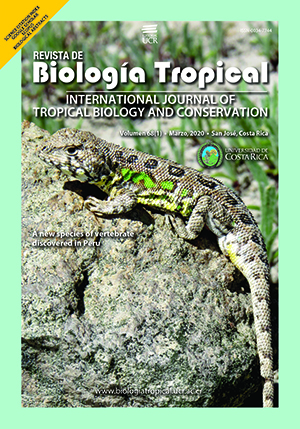Abstract
Introduction: The gastropod Bostryx torallyi shows high variability in shell shape and coloration. Subspecies of this organism have been described based on shell characters but, since they were slightly different, they were synonymized afterwards. Until now, shell variability has been analyzed only descriptively and its anatomy is still unknown. Objective: In this study, I provide anatomical information of B. torallyi and apply a geometric morphometric analysis to evaluate the shell shape variation among specimens. Methods: To accomplish this, type material and numerous lots were examined and dissected out. Additionally, relative warp analysis, based on 9 landmarks in ventral view of the shell, was performed using 80 specimens of 9 localities from Bolivia and Argentina. Results: According to our results, geometric morphometrics is a suitable method to evaluate differences in shell shape among localities; for instance, distinctions in the shell were noticeable between gastropods of low and high altitudes. On the other hand, it was established that the coloration of this species is independent of large-scale factors since the examined specimens came from environments with similar conditions. Furthermore, the sculpture of the protoconch and anatomy of B. torallyi coincided with the other Argentinian species of the genus. Conclusions: Therefore, I concluded that a geometric morphometric analysis of shell shape is a good complement to traditional qualitative description of the characteristics of the shell in this species.
References
Backeljau, T., Baur, A., & Baur, B. (2001). Population and Conservation Genetics. In G. M. Barker (Ed.), The biology of terrestrial Molluscs (pp. 383-412). Wallingford, United Kingdom: CABI Publishing.
Cameron, R. A. D., & Pokryszko, B. M. (2008). Variation in Cepaea populations over 42 years: climate fluctuations destroy a topographical relationship of morph-frequencies. Biological Journal of the Linnean Society, 95, 53-61.
Carvajal-Rodríguez, A., Conde-Padin, P., & Rolan-Álvarez, E. (2005). Decomposing shell form into size and shape by geometric morphometric methods in two sympatric ecotypes of Littorina saxatilis. Journal of Molluscan Studies, 71, 313-318.
Chiba, S. (2004). Ecological and morphological patterns in communities of land snails of the genus Mandarina from the Bonin Islands. Journal of Evolution Biology, 17, 131-143.
Cuezzo, M. G., Miranda, M. J., & Ovando, X. M. C. (2013). Species catalogue of Orthalicoidea in Argentina (Gastropoda: Stylommatophora). Malacologia, 56, 135-191.
Dillon, R. T., & Jacquemin, S. J. (2015). The Heritability of Shell Morphometrics in the Freshwater Pulmonate Gastropod Physa. PLoS ONE, 10(4), e0121962. DOI: https://doi.org/10.1371/journal.pone.0121962
Di Rienzo, J. A., Casanoves, F., Balzarini, M. G., González, L., Tablada, M., & Robledo, C. W. (2016). InfoStat (Version 2016). Retrieved from https://www.infostat.com.ar/
Haase, M., Esch, S., & Misof, B. (2013). Local adaptation, refugial isolation and secondary contact of alpine populations of the land snail Arianta arbustorum. Journal of Molluscan Studies, 79, 241-248.
Hylton-Scott, M. I. (1948). Moluscos del biotopo del Cerro Colorado (Salta). Acta Zoológica Lilloana, 6, 229-239.
Márquez, F., & van der Molen, S. (2011). Intraspecific shell‐shape variation in the razor clam Ensis macha along the Patagonian coast. Journal of Molluscan Studies, 77(2), 123-128.
Miquel, S. E. (1995). Las especies del género Bostryx Troschel, 1847 en la República Argentina (2da. y última parte) (Gastropoda: Stylommatophora: Bulimulidae). Archiv für Molluskenkunde, 124, 119-127.
Miranda, M. J. (2016). Cladistic analysis of the Argentinian species of the genus Bostryx (Gastropoda, Stylommatophora) based on morphological evidence. Papeis Avulsos de Zoologia, 56(10), 109-133.
Miranda, M. J., & Cuezzo, M. G. (2014). Taxonomic revision of Bostryx stelzneri species complex, with description of a new species (Gastropoda: Orthalicoidea: Bulimulidae). American Malacolological Bulletin, 32(1), 74-93.
Ozgo, M. (2004). Cepaea nemoralis (L.) in Southeastern Poland: Association of morpho frequencies with habitat. Journal of Molluscan Studies, 71, 93-103.
Parodiz, J. J. (1947). Contribuciones al conocimiento de los moluscos terrestres Sudamericanos, 5. Comunicaciones Zoológicas del Museo Historia Natural de Montevideo, 2, 1-32.
Pfenninger, M., & Magnin, F. (2001). Phenotypic evolution and hidden speciation in Candidula unifasciata ssp. (Helicellinae, Gastropoda) inferred by 16s variation and quantitative shell traits. Molecular Ecology, 10, 2541-2554.
Pilsbry, H. A. (1901). Manual of Conchology, Pulmonata (2a serie). Philadelphia, United States: Palala Press.
Ploeger, S., & Breure, A. S. H. (1977). A rapid procedure for preparation of radulae for routine research with the scanning electron microscope. Basteria, 41, 47-52.
Quintana, M. (1982). Catálogo preliminar de la malacofauna del Paraguay. Revista Museo Argentino de Ciencias Naturales, Zoología, 11, 61-158.
Ramírez, R., Paredes, C., & Arenas, J. (2003). Moluscos del Perú. Revista de Biología Tropical, 51, 225-284.
Rohlf, F. J. (2017a). TpsDig (Version 2.31). Retrieved from https://life.bio.sunysb.edu/morph/soft-dataacq.html
Rohlf, F. J. (2017b). TpsRewl (Version 1.69). Retrieved from https://life.bio.sunysb.edu/morph
Rohlf, F. J. (2019). TpsUtil (Version 1.78). Retrieved from https://life.bio.sunysb.edu/morph/
Signorelli, J. H., Márquez, F., & Pastorino, G. (2012). Phenotypic variation of south-western Atlantic clam Mactra isabelleana (Bivalvia: Mactridae). Journal of the Marine Biological Association of the United Kingdom, 93(2), 1-7.
Smith, U. E., & Hendricks, J. R. (2013). Geometric Morphometric Character Suites as Phylogenetic Data: Extracting Phylogenetic Signal from Gastropod Shells. Systematic Biology, 62(3), 366-385.
Surmacki, A., Ozarowska-Nowicka, A., & Rosin, Z. M. (2007). Color polymorphism in a land snail Cepaea nemoralis (Pulmonata: Helicidae) as viewed by potential avian predators. Naturwissenschaften, 100, 533-540.
Zischka, R. (1953). Catálogo de las conchas y caracoles bolivianos. Folia Universitaria, 10, 69-85.
##plugins.facebook.comentarios##

This work is licensed under a Creative Commons Attribution 4.0 International License.
Copyright (c) 2020 María José Miranda






